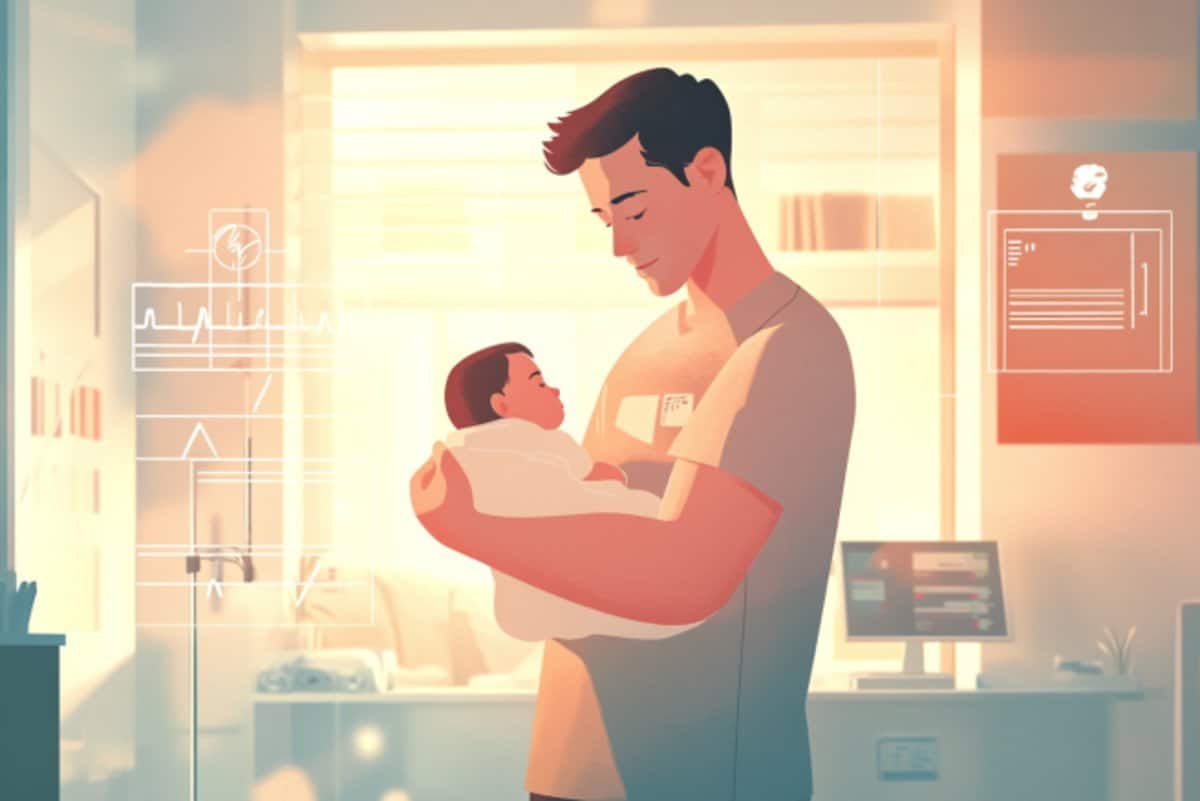Summary: Experts urge healthcare providers to screen new fathers for mental distress, citing strong evidence that paternal mental health affects child development. Depression, anxiety, and stress in new dads are linked to poorer outcomes in children’s emotional, cognitive, and social growth.
While maternal mental health screenings are routine, similar support for fathers is lacking, even though 14% of dads experience postpartum depression. New tools like PRAMS for Dads are helping states identify and address paternal health needs to support families more effectively.
Key Facts:
- Paternal Impact: A father’s mental health affects child development across multiple domains.
- Underrecognized Need: 14% of fathers face postpartum depression, often undiagnosed.
- Public Health Response: PRAMS for Dads aims to expand paternal health monitoring across states.
Source: Ann & Robert H. Lurie Children’s Hospital of Chicago
Experts from Ann & Robert H. Lurie Children’s Hospital of Chicago affirm the need to screen new fathers for mental distress, recognizing the mounting research that underscores the importance of fathers in child development.
Their invited commentary, published in JAMA Pediatrics, accompanies a systematic review, which found that paternal depression, anxiety and stress in the perinatal period are associated with poorer child development in social, emotional, cognitive and language domains.

“Birth of a child can be highly stressful for both parents,” said lead author Craig Garfield, MD, MAPP, pediatrician and founder of the Family & Child Health Innovations Program (FCHIP) at Lurie Children’s, and Professor of Pediatrics and Medical Social Sciences at Northwestern University Feinberg School of Medicine.
“In the U.S., new mothers have been screened routinely for postpartum depression since 2010. We need to apply the same strategy to new fathers, since more and more studies like this one show that paternal mental health impacts child development and the wellbeing of an entire family.”
In the U.S., 14 percent of fathers experience postpartum depression, which approximates the rates of maternal postpartum depression. However, men tend to minimize symptoms of mental distress, so this percentage might be an underestimate.
“As clinicians, we need to rethink how we approach new fathers,” said Dr. Garfield.
“We need to engage them throughout pregnancy and the perinatal period and normalize feelings of sadness or fear or anxiety that are common during this lifechanging event. Clinicians should discuss with fathers warning signs for depression to help them recognize when either parent might need help.”
To better understand the experiences and needs of men as they enter fatherhood, Dr. Garfield helped develop and launch a first-of-its-kind public health survey tool for fathers called PRAMS (Pregnancy Risk Assessment Monitoring System) for Dads. Started in Georgia, PRAMS for Dads will be operational in eight states by the end of 2025, with efforts ongoing to establish the system in more states.
“PRAMS for Dads helps us focus state resources on addressing the most pressing issues for new fathers,” explained Dr. Garfield.
“It also helps us further appreciate the impact fathers have on the health and wellbeing of children so we can better support them in adopting healthy behaviors.”
Findings from Dr. Garfield’s previous research using data from PRAMS for Dads revealed that fathers can make a huge difference in whether an infant is breastfed and placed to sleep safely.
Dr. Garfield recently participated in a three-day “Mapping the Future of Fatherhood in Australia” event, which was a culmination of his two months as a “Thinker in Residence” at Deakin University in Australia, where the authors of the current JAMA Pediatrics paper are based. His blog recounts this experience and the discussions on how to impact the health and wellbeing of fathers for the best outcomes for children.
In addition to Dr. Garfield, the commentary authors from Lurie Children’s include Clarissa Simon, PhD, MPH, and John James Parker, MD.
About this mental health and neurodevelopment research news
Author: Julianne Bardele
Source: Ann & Robert H. Lurie Children’s Hospital of Chicago
Contact: Julianne Bardele – Ann & Robert H. Lurie Children’s Hospital of Chicago
Image: The image is credited to Neuroscience News
Original Research: Closed access.
“Paternal Mental Health and Child Development Across Multiple Domains” by Craig Garfield et al. JAMA Pediatrics
Abstract
Paternal Mental Health and Child Development Across Multiple Domains
The systematic review and meta-analysis by Le Bas and colleagues provides a comprehensive synthesis of the association between paternal perinatal mental distress (depression, anxiety, mixed depression and anxiety, stress) and poorer child developmental outcomes in studies from around the globe.
The authors should be commended for this ambitious project that included identifying 8023 studies, examining 777 full text articles, and selecting 84 studies with a total of 674 effects sizes.
They further reduced publication bias by contacting authors of studies that met criteria but did not report outcomes of interest, which resulted in 244 additional effects identified.
This study also stratified outcomes for different types of mental distress, developmental outcome, timing of assessment, and offspring age group.
Their conclusions are clear: the association between paternal mental illness and poorer child development was robust for mental distress type (anxiety, depression, and stress), developmental outcome (global, socioemotional, cognitive, language), timing (antenatal vs postnatal), and child age.






